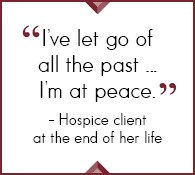 Throughout cultural, religious and spiritual traditions, forgiveness is one of the most important values. Forgiving others and asking for their forgiveness is not easy. But there are some helpful ways to proceed for those of us who find forgiveness hard, or who have very difficult things to forgive.
Throughout cultural, religious and spiritual traditions, forgiveness is one of the most important values. Forgiving others and asking for their forgiveness is not easy. But there are some helpful ways to proceed for those of us who find forgiveness hard, or who have very difficult things to forgive.
There are layers of forgiveness we begin to uncover when we decide to free ourselves of the hurt and anger, the need for revenge and the bitterness we’ve been holding on to. Research suggests forgiveness has many health benefits, including:
- Lowering anxiety and high blood pressure
- Decreasing anger and depression
- Increasing self-esteem, hope and harmony
- Restoring relationships
Forgiveness is also a gift—a gift we give ourselves and others. But it is a process, and often, the most difficult things to forgive take time and work on our part. We need to allow ourselves grace during this process, and extend the same grace and understanding to others who are traveling the journey of forgiveness. Working toward forgiveness not only makes a positive difference to the person who is forgiving, but also to the person who is being forgiven.
To fully understand forgiveness, it’s helpful to first recognize what forgiveness is NOT:
- Forgetting—sometimes we can forget, but other times we need to remember a painful lesson
- Reconciliation—it may not be wise or safe to trust that person again
- Saying it was OK
- Saying there are no consequences, legal or personal, because there often should or will be
- Given because someone deserves it—it is given because the offended person is ready to forgive
Forgiveness is my letting go of my need to punish someone else and my desire to stop carrying around the hurt and anger someone caused me.
The following process can be helpful during forgiveness:
- Uncover the truth of my hurt, shame and anger; specifically name what happened and write it down if it’s helpful.
- Become willing to forgive—recognize that the ways we’ve been dealing with the hurt and anger aren’t helping us. Commit to a change of heart and letting go of the hurt and anger. Seek help from a trusted friend or family member, counselor or lean on your faith, as needed.
- Begin working toward forgiving—try to see the person who hurt you in a new light as another imperfect human being, like all of us. Choose peace for yourself and empathy and compassion for the person. Perhaps pray for the person if that is your tradition.
- Find a reason to forgive (i.e., because we’ve been forgiven, find peace and reduce our painful emotions, such as anger and bitterness)—find purpose in this process for your life and for those who love you. When possible, tell the offender in person, or by letter, that you’ve forgiven them and do what you can to restore peace in relationships.
The significance of forgiveness at end of life is it can bring healing to the person who is doing the forgiving and to the person who is being forgiven. It can also impact the family and the greater community of relationships. Forgiveness demonstrates an invaluable model to those who are watching how we die.
Many hospice patients have said the hard part isn’t forgiving someone else, but rather, asking for forgiveness from someone else and forgiving yourself.
The steps in forgiving ourselves are similar:
- Be honest and specific about what we’ve done and what we feel guilty or ashamed about
- Become willing to forgive and commit to work on this and get help, if needed
- Recognize we’re imperfect and choose compassion for ourselves
- Find purpose and meaning for ourselves in this process
For those who are part of a religious tradition, faith, prayer and acceptance of God’s grace and mercy are critical parts of this process of forgiveness. Having the assurance of God’s grace and mercy are important for many dying people. Depending on one’s faith tradition, scripture verses can be helpful, as well as the sincere words of forgiveness from family, friends and faith leaders.

We don’t always have the opportunity to offer our forgiveness because the person who hurt us may have died or are no longer available. The process can still be similar, and it may be helpful to write a letter stating the hurt or offense and the process of forgiveness. For some, having a ritual like burying or burning the letter can be healing.
If the person you are forgiving is still alive but no longer able to respond meaningfully, they can likely still hear you on some level. Your words of, “Please forgive me,” “I forgive you,” “Thank you” and “I love you” may be precisely the words your loved one was waiting to hear.
If you need assistance, Hospice of the Red River Valley can help, contact us at (800) 237-4629 or questions@hrrv.org.
About Hospice of the Red River Valley
In 1981, Hospice of the Red River Valley was founded on the belief that everyone deserves access to high-quality end-of-life care. We fulfill our nonprofit mission by providing medical, emotional, personal and spiritual care, as well as grief support to our patients, their families and caregivers during a tender time in life. Our staff helps those we serve experience more meaningful moments through exceptional hospice care, 24 hours a day, 365 days a year, wherever a patient calls home. The organization serves more than 40,000 square miles in North Dakota and Minnesota, including in and around Bismarck, Detroit Lakes, Devils Lake, Fargo, Fergus Falls, Grand Forks, Lisbon, Thief River Falls, Valley City and many more communities. Hospice of the Red River Valley offers round-the-clock availability via phone, prompt response times and same-day admissions, including evenings, weekends and holidays. Contact us anytime at 800-237-4629 or hrrv.org.



